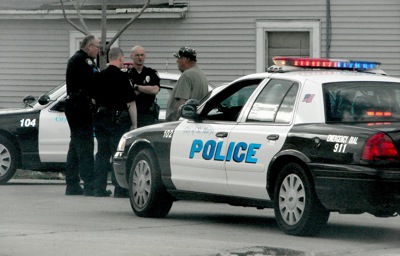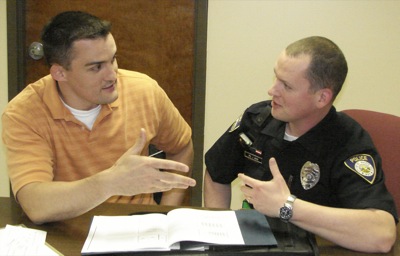Thursday, April 30th, 2009
Crisis negotiators speak low and slow
By Janie Southard

Photo by Janie Southard/The Daily Standard
St. Marys Patrolman Josh Boos (back to camera), a trained crisis negotiator, recently was called to the scene of an attempted suicide of a man suspected of having mental health issues. After Boos convinced him to come down from a second-story window, he was taken to St. Rita's Medical Center for evaluation. The man in the hat was not involved in the situation.
ST. MARYS - Late last year a local teenager broke into his former girlfriend's house armed with a knife. The apparent plan was a murder/suicide. By the time city police crisis negotiators arrived he was barricaded in the bathroom.
Once at the scene the negotiators talked with other officers and people who might know the situation. The aim was to gauge the depth of the teen's emotional state as well as discover background information.
As negotiators for the St. Marys City Police Department, Sgt. Jake Sutton and Patrolman Josh Boos took up position outside the open bathroom. They were backed up by police tactical squad whose guns were drawn and fixed on the teen.
After 31/2 hours of negotiation the teen surrendered with no one hurt - and that's always the goal.
"Every incident like this has life and death potential," Sutton said. "Everyone's life is at stake. It takes less than a second to redirect your aim from yourself to the cops at the door."
If the suspect makes a threatening move with his weapon, he will be disarmed by whatever force it takes.
Sutton and Boos, police officers for 10 and two years, respectively, both trained at the Ohio Peace Officers Training Academy in London and have attended annual study seminars.
"People get upset for different reasons. We all do to some degree. It could be depression or alcohol-fueled, or because of illness or an affair. For whatever reason, it's irrational thinking ... Emotional perception is a real teeter-totter," Sutton said.
Most crisis negotiation centers around threats of suicide and semi-desperation, Boos added.
"It's important for us to understand what is driving the person to want to end his life. Was it a significant event or date like a relationship breakup, a death in the family or of a friend, loss of home, spouse, job ... That's why we want to talk to other officers and people at the scene who can tell what has happened and who are the people involved," Boos said.
Sutton added that it's usually not just one trigger but of multitude of events.
A big part of negotiation is to slow things down and get the person off his emotional momentum. As well, it provides the time, if necessary, for the tactical force to get into position. Negotiators need good tactical backup, period.
Sutton said empathizing is important. Letting the person know you understand that life is hard and everyone feels frustrated at times. The objective is to get the person to vent verbally, let off steam. One motto officers keep in mind is that getting the person to relax takes "low and slow" conversation.
"Sometimes it's really hard to empathize with suicide, like when it's a child molester or a guy who's committed rape. But our job is to see that justice can be served. So our goal that no one gets hurt remains the same," Sutton said.
The officers agree that, yes, their job is often alarming.
"Any time you know there's a weapon involved, you know you could get hurt bad," Sutton said.
The first local crisis negotiation was handled several years ago by now-chief of police Greg Foxhoven, who was the only trained negotiator in the department at the time. Although he keeps up with the training, he chooses not to negotiate unless absolutely necessary because as chief he has ultimate decision power.
That first negotiation took place under the overpass on U.S. 33 when an Indiana semi-driver barricaded himself in his truck. The man had molested a child and was in deep remorse and desperation. That incident was put down after many hours with no one hurt.
"People think you talk someone down but actually you listen them down. You keep them talking so they can get past that point of (ending a life)," Sutton said. "So we talk just enough to keep them going. Low and slow, and active listening - that's the difference."

Photo by Janie Southard/The Daily Standard
Sgt. Jake Sutton, left, and Patrolman Josh Boos, both officers with St. Marys City Police Department, are trained crisis negotiators. Auglaize County has six trained negotiators, three of whom are in St. Marys.



